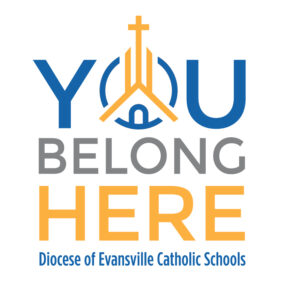By Dr. Daryl Hagan
Superintendent of Schools
Special to The Message
We in the Catholic Education Office thank our parents and guardians for the successful and healthy start to the school year. Catholic schools are engaged in assisting families in the formation of our faith while providing an excellent, rigorous education for the students we serve. Your diligence in completing self-screenings, frequent handwashing, wearing masks and keeping students home when symptomatic have made the difference.
 We remind all families of children attending school in the Diocese of Evansville that our local health departments are providing definitions and recommendations that reflect the guidance of the CDC and the Indiana State Department of Health.
We remind all families of children attending school in the Diocese of Evansville that our local health departments are providing definitions and recommendations that reflect the guidance of the CDC and the Indiana State Department of Health.
COVID-19 is a contagious respiratory illness caused by a new coronavirus called SARS-CoV-2. People with COVID-19 sometimes have a cough, fever, feel like it is hard to breathe, or even lose their sense of taste or smell. Other symptoms include congestion or runny nose, diarrhea, headache, nausea or vomiting, muscle pain or fatigue, sore throat or chills. Symptoms range from mild to severe and may appear 2-14 days after exposure. When an individual tests positive for COVID-19, the next step is to identify close contacts.
An individual is considered a close contact to a positive COVID-19 case if any of the following is true:
- Was within 6 feet of a positive person for more than 15 minutes total in a day.
- Had physical contact with the person.
- Had direct contact with the respiratory secretions of the person (from coughing, sneezing, contact with dirty tissue, shared drinking glass, food, or other personal items).
- Lives with or stayed overnight for at least one night in a household with the person.
These close-contact criteria apply regardless of mask use, face shields or physical barriers like Plexiglas or plastic barriers.
Close contacts should remain home in quarantine for 14 days from their last known exposure to someone with a confirmed case of COVID-19, regardless of a negative test.
Definitions
Isolation means keeping sick people away from healthy ones. This means the sick person rests in his or her own bedroom or area of your home and stays away from others. This includes staying home from school.
Quarantine means separating people who were around someone who was sick, in case they get sick. Since people who were around other sick people are more likely to get sick themselves, quarantine prevents them from unintentionally spreading the virus to other people even before they realize they are sick. People who are in quarantine stay at home and avoid going out or being around other people. This includes staying home from school, and community and school-sponsored events.
The goals are to keep our children, faculty and staff healthy, and to keep schools open for in-person instruction. With fall break on the horizon for many schools, please continue to self-screen daily, wear masks and practice social distancing.
